#iphigeneia
Explore tagged Tumblr posts
Text
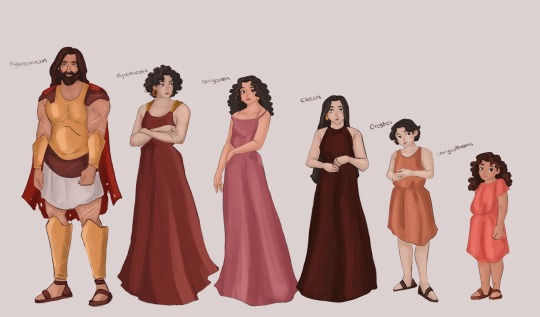
The Mycenaean Royal Family
#clytemnestra#agamemnon#iphigenia#iphigeneia#electra#orestes#chrysothemis#the oresteia#the iliad#the oddyssey#helen of sparta#helen of troy#penelope of sparta#penelope of ithaca#telemachus#odyessus#menelaus#the odyssey#epic the musical#trojan war
620 notes
·
View notes
Text
Memory itself, the ability to describe this founding moment in the future of the ills of the house of Argos, is beginning to strain and crumble under the terrible weight of the past. The focus on silence and speech in the two stanzas we have been listening to sets up the aposiopesis that follows; as though these old men knew already that the end would have to be left out, unspeakable and unspoken. It is as though, recalling in words the terrible scene at Aulis, they are also inaugurating a meditation on the impossibility of continuing the story; as if, faced with the agonizing clarity of the tableau they are describing, they are already dimly aware that their speech will be unable to show the whole picture, that they will have to leave it fragmented, leave us with an image that will have to serve as synecdoche for the whole narrative. [Iphigenia’s] death is effaced even as it is described. […] Her silence, her nakedness, and her being transformed into the kind of visual object that can be vividly described are all part of the narrative: in this story, Iphigenia turns into an image. At the moment of her death, she is transformed, not into an animal but into a mimetic representation, a painting. […] This memory of Agamemnon’s attempt to transform his daughter into a mute sacrificial beast tells us something about the impossibility of remembering the atrocity. Iphigenia’s death begins to disappear behind a cloud of occluding language and gestures, and it is clear speech, memory itself, that is being killed. Faced with the task of uttering what we cannot, we resort to literary language. We speak in figures that, we hope, will conceal the unspeakable while leaving it legible at the same time. Thus the task of remembering and narrating the sacrifice of Iphigenia has something in common with undertaking the sacrifice: in both cases we must proceed toward the impossible, hoping that at the final moment the thing will be elided or replaced in some salvific transfiguration. Just as the old men leave off their story before the critical moment, so would Agamemnon hope that something will transform or translate Iphigenia, so that the impossible act would itself be transformed into something possible, as Isaac was replaced at the last moment beneath the blade of Abraham. Agamemnon tries to do this for himself twice, first by silencing Iphigenia, an attempt to make her mute and bestial, and second by forgetting ("setting at naught") her former status in the house. These are attempts, in the absence of divine intervention, to make Iphigenia into something she is not, into an empty simulation of the thing that would have made her murder atrocious.
— Iphigenias at Aulis: Textual Multiplicity, Radical Philology, Sean Alexander Gurd
#reading#iphis.txt#iphigeneia#oresteia#[silence]#who will be lost in the story we tell ourselves? who will be lost in ourselves?#the child is the price#how is a greek chorus like a lawyer#eidolon#poetics#iphigenia#the oresteia#aeschylus#agamemnon
80 notes
·
View notes
Text
Clytemnestra: I crawl into bed, my ghost child beside me. I dread the nights because she comes to torture me with her eyes of muck and the blood spilling from the gash to her throat as if it was cut a second ago. And her fury, you’d think it would split the walls as she howls out the injustice, that I am still here and will not come to her though she has begged me, that she will wait no longer, that she will come to me. And I believe none of these things and still they happen.
Girl on an Altar, Marina Carr
#girl on an altar#marina carr#iphigeneia at aulis#iphigenia at aulis#iphigenia#iphigeneia#the oresteia#oresteia#clytemnestra#klytemnestra#klytaimnestra#words#tagamemnon#greek myth retellings#house of atreus
41 notes
·
View notes
Text
"Iphigeneia and Antigone are sensationally significant victims: Iphigeneia's sacrifice is the lynchpin of all that happens to Agamemnon afterwards; Antigone's death is the transcendent culmination of Sophokles' play. The deaths change the stories in which they are set, transform the lives around them and force moral reasoning to an extreme confrontation with itself.
Polyxena's death is different. It is not placed at the beginning or the end of the play but muffled in the middle; does not constitute either cause or culmination of the action; it does not change the plot or other people in any substantial way, and it forces us to no moral conclusion at all except that such a sacrifice is irrelevant to the world in which it is staged.
Polyxena is a shooting star that wipes itself across the play and disappears. And Euripides wants us to notice this -- this irrelevance of Polyxena.
- Anne Carson, in the preface to "Hekabe," from Grief Lessons: Four Plays by Euripides
132 notes
·
View notes
Text





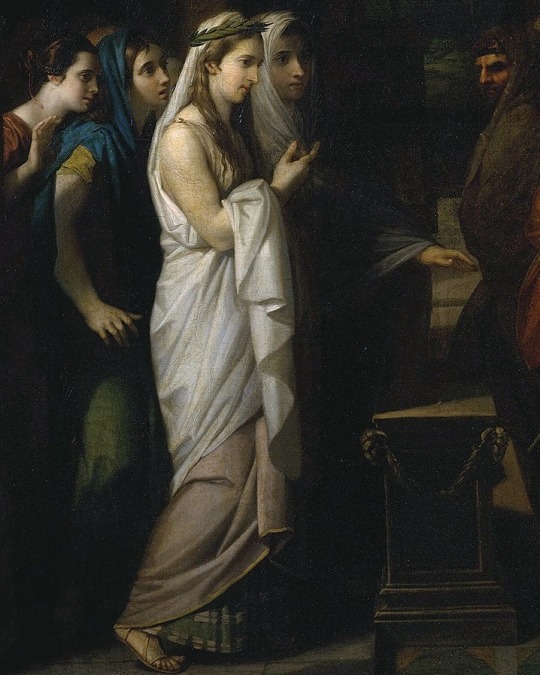
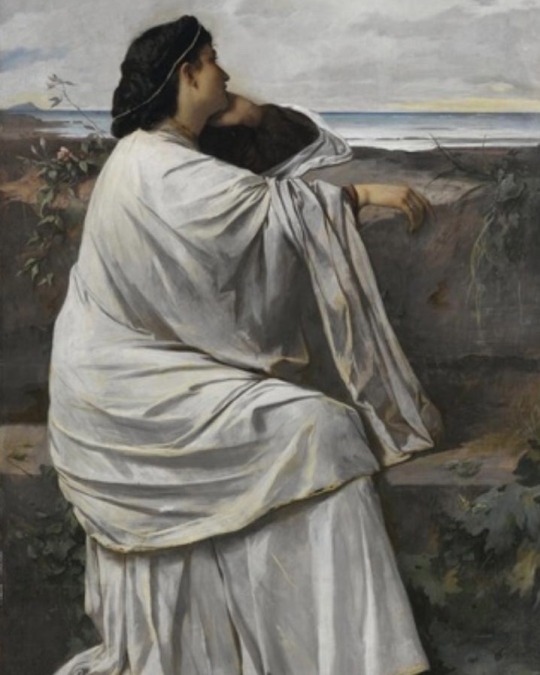

@mothercain as iphigeneia
#ethel cain#iphigenia#art#the oresteia#aeschylus#iphigeneia in tauris#greek myth#greek mythology#classics#hayden anhedönia#iphigeneia#clytemnestra#euripides
367 notes
·
View notes
Text
“She comes to meet death, To stain the altar of the goddess, To hold her girl-throat Toward the knife-thrust.”
― Euripides, from 'Iphigeneia in Aulis' (translated by H.D.)
#quote#H.D.#Hilda Doolittle#Euripides#Iphigeneia in Aulis#poetry#Collected Poems 1912 - 1944#tell all the truth but tell it slant#current reading#current reading quotes#not out of void but out of chaos#Iphigeneia
64 notes
·
View notes
Text



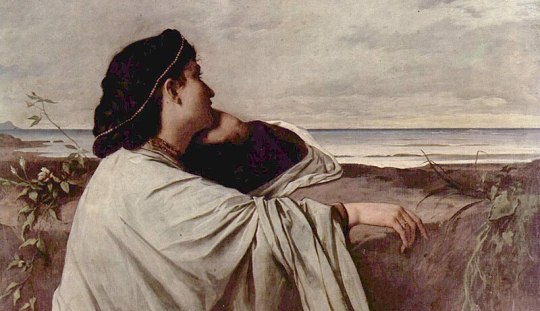







alicent and otto hightower as ifigeneia and agamemnon
The fathers of myth, the myth of the fathers: Euripides and Kierkegaard by Bruna Giacomini (2010) / House of the Dragon (2022-) / Ptolemaea by Ethel Cain / Iphigenie (1871) by Anselm Feuerbach / Oresteia by Aeschylus / Iphigeneia (1977) Dir. Michael Cacoyannis
#girls doomed by the narrative we love you!#web weaving#alicent hightower#otto hightower#house of the dragon#iphigeneia#greek tragedy#parallels#ifigeneia
65 notes
·
View notes
Text
The Names of Agamemnon’s Daughters and the Death of Iphigenia – SENTENTIAE ANTIQUAE
#agamemnon#iphigeneia#iphigenia#iphimede#iphianassa#elektra#electra#laodike#chrysothemis#klytaimnestra#clytemnestra
7 notes
·
View notes
Text

klytaimnḗstrā in mykē̂nai
#tee writes poetry#clytemnestra#child death tw#agamemnon#iphigeneia#murder tw#greek mythology#the oresteia#iphigenia in aulis
30 notes
·
View notes
Text
“If he had to do that, he might never press the button!” well, yeah. that's... the point.
the interesting thing here is that artemis would likely not have asked this of agamemnon if he hadn't killed a deer in her sacred forest before setting sail for troy. he fucked up and she made him pay for it by demanding he sacrifice one of his daughters (by way of the seer calchas).
in middle school during my Intense Greek Mythology Phase, Artemis was, as you can likely guess, my best girl. Iphigenia was my OTHER best girl. Yes at the same time.
The story of Iphigenia always gets to me when it's not presented as a story of Artemis being capricious and having arbitrary rules about where you can and can't hunt, but instead, making a point about war.
Artemis was, among other things--patron of hunting, wild places, the moon, singlehood--the protector of young girls. That's a really important aspect she was worshipped as: she protected girls and young women. But she was the one who demanded Agamemnon sacrifice his daughter in order for his fleet to be able to sail on for Troy.
There's no contradiction, though, when it's framed as, Artemis making Agamemnon face what he’s doing to the women and children of Troy. His children are not in danger. His son will not be thrown off the ramparts, his daughters will not be taken captive as sex slaves and dragged off to foreign lands, his wife will not have to watch her husband and brothers and children killed. Yet this is what he’s sailing off to Troy to inevitably do. That’s what happens in war. He’s going to go kill other people’s daughters; can he stand to do that to his own? As long as the answer is no—he can kill other people’s children, but not his own—he can’t sail off to war.
Which casts Artemis is a fascinating light, compared to the other gods of the Trojan War. The Trojan War is really a squabble of pride and insults within the Olympian family; Eris decided to cause problems on purpose, leaving Aphrodite smug and Hera and Athena snubbed, and all of this was kinda Zeus’s fault in the first place for not being able to keep it in his pants. And out of this fight mortal men were their game pieces and mortal cities their prizes in restoring their pride. And if hundreds of people die and hundred more lives are ruined, well, that’s what happens when gods fight. Mortals pay the price for gods’ whims and the gods move on in time and the mortals don’t and that’s how it is.
And women especially—Zeus wanted Leda, so he took her. Paris wanted Helen, so he took her. There’s a reason “the Trojan women” even since ancient times were the emblems of victims of a war they never wanted, never asked for, and never had a say in choosing, but was brought down on their heads anyway.
Artemis, in the way of gods, is still acting through human proxies. But it seems notable to me to cast her as the one god to look at the destruction the war is about to wreak on people, and challenge Agamemnon: are you ready to kill innocents? Kill children? Destroy families, leave grieving wives and mothers? Are you? Prove it.
It reminds me of that idea about nuclear codes, the concept of implanting the key in the heart of one of the Oval Office staffers who holds the briefcase, so the president would have to stab a man with a knife to get the key to launch the nukes. “That’s horrible!,” it’s said the response was. “If he had to do that, he might never press the button!” And it’s interesting to see Artemis offering Agamemnon the same choice. You want to burn Troy? Kill your own daughter first. Show me you understand what it means that you’re about to do.
#i think you mean tens or hundreds of thousands of lives OP#greek mythology#trojan war#agamemnon#iphigeneia#artemis#you wanna kill other people's sons and daughters? fine.#are you prepared to sacrifice your own?#tbh the idea of implanting the key to the nuke briefcase in an oval office staffer's chest cavity is my favorite takeaway from this post
21K notes
·
View notes
Text

Bertholet Flemalle, The Sacrifice of Iphigeneia.
#Bertholet Flemalle#powerpoint#Belgium#Liege#greek mythology#human sacrifice#filicide#Agamemnon#Clytemnestra#princess#Iphigeneia
1 note
·
View note
Text

Clytemnestra and Aegisthus
#clytemnestra#aegisthus#the oresteia#agamemnon#every time I write Agamemnon I read it as Agamenonmenom#like the Chappell Roan song#menelaus#house of atreus#orestes#Electra#iphigeneia#helen of troy#helen of sparta#penelope of sparta#penelope of ithaca#odyessus
50 notes
·
View notes
Text


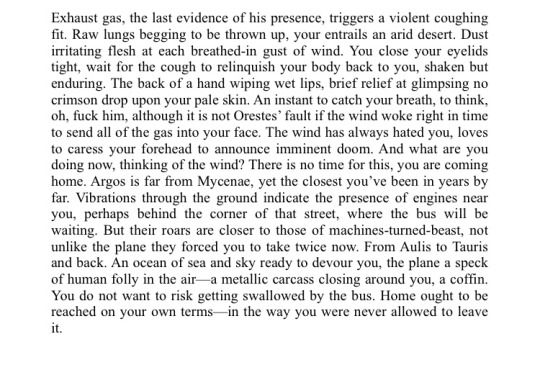
opening of the first part of this weird thing i’m writing.
#🦌#words#iphigeneia#orestes#atreidai#house of atreus#elektra#electra#iphigenia#oresteia#iphigenia in aulis#greek mythology#!#myth retelling#writing#echo of an echo#elaphomancy
65 notes
·
View notes
Text
iphigeneia is so precious to me (i’m 1500 words into writing the scene of her sacrifice, from her pov. i need to read iphigeneia at aulis again tomorrow because i’ve been writing from memory and i know i made mistakes/forgot to include some ritual steps)
(also i know euripides says calchas is the one who holds the knife but for me it’ll always be agamemnon, it might not make sense but idc)
#i’m always so obsessed with child sacrifices in myths#like i think about the binding of isaac everyday too#helpol#yes i’m dedicating this writing to artemis#iphigenia#ancient greek mythology#ancient greece#greek myth retellings#greek myths#greek mythology#iphigeneia#writing#writers on tumblr
52 notes
·
View notes
Text
I'm probably the only bitch who prefers the idea of Chrysothemis being older than Electra
#idk but Electra and Orestes being the two youngest hits harder#and like Chrysothemis has all of this pressure as the now oldest daughter that now she focuses sm on pleasing her mother and everyone else#that she forgets her younger siblings Leaving Electra to take the role of caretaker for her brother#She tries SO hard to be Iphigenia (or what she thinks Iphigenia was) that she ends up as a docile never-does-anything-inappropriate daughter#because thats genuinely what she remembers Iphigeneia as (my version of Iphigenia has a very big age gap with her little siblings so+#none of them really remembers her tha well)#Chrysothemis was like 8-9 when the sacrifice happened so she just remembers the most basic things about her sister#which IS considerably more than Electra and Orestes remember but still not enough#Chrysothemis#Electra#greek mythology#tagamemnon
31 notes
·
View notes
Text






Iphigeneia Alyxandrine Ronec, AU version of my main Self Insert OC(But only in the TES universe, will be in my Skyrim fic as well), Worshipper of Auri-El/Akatosh, Dibella, Mara, and Ithelia(Showcasing her worship of Ithelia in up gif set).
This is on Elder Scrolls Onlines Public Test Server, inside of the Shattered Mirror Isle house(That as of right now, hasn't been released on the main servers yet).
Her outfit is Ebonshadow, Fang Lair, and Horned Dragon themed, with Marble White and Spectral Blue Dyes.
#here I come with shitty ass gifs again LOL#tesgala#tesgala25#the elder scrolls#tes#Iphigeneia Alyxandrine Ronec#She is an ALT self insert but is an AU version of my main one#so she is and isn't my main one?#if that makes sense?#idk LOL#alt self insert oc#alt self insert#oc#Ithelia thruther over here lol#gif#gifs#gif set#also sorry about the alt text descriptions I'm not very good at wording things#so if anyone wants to help out with it that would be great
23 notes
·
View notes